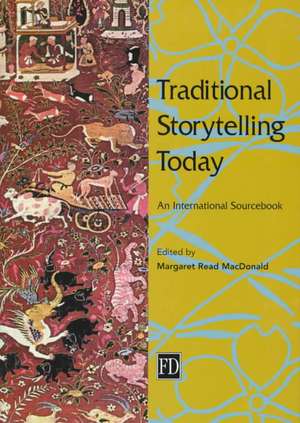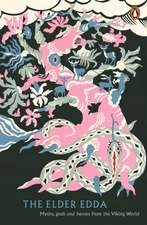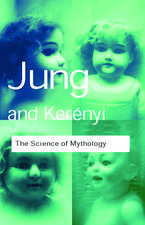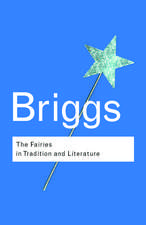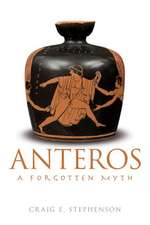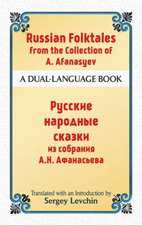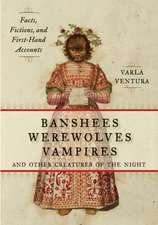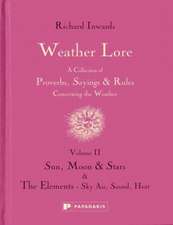Traditional Storytelling Today: An International Sourcebook
Editat de Margaret Read MacDonalden Limba Engleză Hardback – apr 1999
Preț: 1582.72 lei
Preț vechi: 1930.14 lei
-18% Nou
Puncte Express: 2374
Preț estimativ în valută:
302.89€ • 315.06$ • 250.05£
302.89€ • 315.06$ • 250.05£
Carte tipărită la comandă
Livrare economică 12-26 aprilie
Preluare comenzi: 021 569.72.76
Specificații
ISBN-13: 9781579580117
ISBN-10: 1579580114
Pagini: 644
Dimensiuni: 178 x 254 x 41 mm
Greutate: 1.54 kg
Ediția:1
Editura: Taylor & Francis
Colecția Routledge
Locul publicării:Oxford, United Kingdom
ISBN-10: 1579580114
Pagini: 644
Dimensiuni: 178 x 254 x 41 mm
Greutate: 1.54 kg
Ediția:1
Editura: Taylor & Francis
Colecția Routledge
Locul publicării:Oxford, United Kingdom
Recenzii
"It is not easy to take in the breadth of scholarship involved in compiling a work of this kind... The essay are enlightening, convincing, and immensely readable." -- Reference Reviews
"An essential reference work. Traditional Storytelling Today will appeal to a variety of users: students, teachers, librarians, folklorists, and storytellers, as well as the general public. Recommended." -- Reference & Users Services Quarterly
"The piquant, engaging, cross-cultural 'stories' in this excellent sourcebook/bibliography will expand instruction and learning in literature, anthropology, oral history, geography, sociology, psychology, music, dance, art, and drama... The analyses one could apply to the material in this astonishingly diverse collection are limitless... For all collections." -- Choice
"An essential reference work. Traditional Storytelling Today will appeal to a variety of users: students, teachers, librarians, folklorists, and storytellers, as well as the general public. Recommended." -- Reference & Users Services Quarterly
"The piquant, engaging, cross-cultural 'stories' in this excellent sourcebook/bibliography will expand instruction and learning in literature, anthropology, oral history, geography, sociology, psychology, music, dance, art, and drama... The analyses one could apply to the material in this astonishingly diverse collection are limitless... For all collections." -- Choice
Cuprins
1: Sub-Saharan Africa; 1: Hunters' Narratives; 2: Central African Epics; 3: To Make Our World a Gentler, More Compassionate World; 4: The Fulani Epics; 5: The Ga Folktale: Context, Themes, and Techniques; 6: The Igbo Folk Epic; 7: Igbo Stories and Storytelling; 8: The Meaning of the “Meaningless” Refrain in Igbo Folk Songs and Storytelling Events; 9: The Dogon Creation Story; 10: The Storytelling Event Among the Igede of Nigeria; 11: Ju/'hoan Folktales and Storytelling: Context and Variability; 12: Storytelling: A Thread of Life Within the Kamha Community; 13: Narrative Performance in a Changing World: The Case of the “Storytellers” in Kenya; 14: The Meditation of Time, the Wisdom of the Teller, the Void of the World; 2: Asia; 15: The Chantefable Tradition of Suzhou; 16: Antiphonal Epics of the Miao (Hmong) of Guizhou, China; 17: Rajasthani Hero Legends; 18: Two Contemporary Performances of Savitri in Pune, India; 19: Saneguruji Storytelling Academy, Transformation of Domestic Storytelling in India; 20: Storytelling in Middle-Class Indian Families; 21: A System of Narrative Performances in Middle India; 22: Indonesian Storytellers and Storytelling; 23: Religious Tales and Storytelling in Japan; 24: Still Telling in Japan: Traditional Folktellers; 25: P'ansori, the Ancient Korean Art of Storytelling; 26: Enduring Scars: Cautionary Tales Among the Senoi Semai, a Peaceable People of West Malaysia; 27: Professional Storytelling in West Sumatra; 28: The Tradition of Storytelling in Malaysia; 29: Thet Siang Performance in Isaan; 30: Storytelling: A Means to Maintain a Disappearing Language and Culture in Northeast Thailand; 3: Australia and the Pacific; 31: Nallawilli-Sit Down (and Listen). The Dreamtime Stories—An Oral Tradition; 32: Ka Ola Hou ‘Ana o ka ‘?lelo Hawai'i i ka Ha'i ‘Ana o ka Mo'olelo i Kéia Au Hou: The Revival of the Hawaiian Language in Contemporary Storytelling; 33: A Gossamer of Wisdom; 34: Tale Telling on a Polynesian Atoll; 4: Europe; 35: The Albanian World in the Folk Teller's Stories; 36: Basque Storytelling and the Living Oral Tradition; 37: Present-Day Storytelling in Northeastern Bulgaria; 38: Storytelling in Croatia; 39: Traditional Legends in Contemporary Estonian Folklore; 40: Factors Influencing the Formulation of Narration; 41: New Storytellers in France; 42: Storytelling in Spanish Galicia; 43: Traditional Storytelling Today in the East of Northern Germany; 44: Märchen 2000: Taking Care of the Fairy Tale in Germany; 45: Greek-Albanian (Arvanítika) Interactive Storytelling and the Legitimation of Critical Discourse; 46: Aspects of Narrative Tradition in a Greek Gypsy Community; 47: Folklore Repertoires: Male, Female; 48: Traditional Storytelling in Ireland in the Twentieth Century; 49: A Storyteller's Growing Consciousness; 50: Once Upon a Time in Vale Judeu; 51: Women's Stories Among Indigenous Peoples of the Russian Far East; 52: Storytelling Traditions in Scotland; 53: “Our Stories Are Not Just for Entertainment”: Lives and Stories Among the Travelling People of Scotland; 54: Storytelling in the Rhythm of People's Everyday Life: An investigation into Contemporary Slovakia; 55: Problems in Translation and Storytelling Using Switzerland as Example; 5: Middle East and North Africa; 56: Egyptian Peep-Show Storytelling; 57: Narrating Epics in Iran; 58: Stories About a Moroccan Storyteller; 59: Storytelling in Palestine; 60: Matrilineal Myths, Herbal Healing, and Gender in Tuareg Culture; 61: Tunisian Storytelling Today; 6: Native America; 62: Storytelling and Teaching: A Cree Example; 63: What's in an Ending? Indian Storytelling of the Inland Northwest; 64: Analysis of a Hupa Storytelling Event; 65: Traditional Storytelling at San Juan Pueblo; 66: Lushootseed Language and Story Revival; 7: North America; 67: Where Have All the Märchen Gone?: Or Don't They Tell Those Little Stories in the Ozarks Any More?; 68: Jack Tales; 69: Cowboy Poetry and Other Occupational Folk Poetry; 70: Del Ringer and His Tales of Salmon River, Idaho; 71: Fifty Functions of Storytelling; 72: “If We Don't Joke with Each Other, We Won't Have No Fun, Will We?” Storytelling in the Richard Family of Rangeley, Maine; 73: Stories of Emergency Medical Responders; 74: Storytelling Style and Community Codes Among the Swiss Volhynian Mennonites; 75: Storytellers and the Art of Storytelling in the Mexican Culture; 76: Traditional Storytelling Among French Newfoundlanders; 77: Logger Poetry; 8: South America; 78: Argentinian Folktale: A Genetic Approach; 79: The Art of Bahamian Narration; 80: “Fattening” in Belizean Creole Storytelling; 81: Holding on to the Past: Maya Storytelling in Belize; 82: Function and Performance of the Chilean Folktale Today; 83: Lira Popular in Chile: Between Traditional Poetry and Popular Urban Versifying; 84: Discourse and Storytelling in Otavalo Song: Resonance and Dissonance in San Juanitos; 85: Guaranitic Storytelling; 86: We Are the Real People: Tzotzil-Tzeltal Maya Storytelling on the Stage; 87: Fragments From the Past: The Politics of Storytelling in Morelos, Mexico; 88: Storytelling and Mental Representation Among Totonac Indians (Mexico); 89: Exemplary Ancestors and Pernicious Spirits: Sibundoy Concepts of Cultural Evolution; 90: Saramaka Maroon Folktales in Comparative Afro-American Perspective; 91: The Art of Storytelling: Field Observations in Venezuela; 9: Theory; 92: Children's Telling of Ghost Stories; 93: Organizational Storytelling; 94: The Role of Traditional Stories in Language Teaching and Learning; 95: The Storytelling Revival; 96: Preadolescent Girls' Storytelling; 97: An Analysis of Five Interviews with Storylisteners to Determine How They Perceive the Listening Experience; 98: Urban Legends; 99: Cross-Culture, Cross-Class, Crossed Wires: A Case Analysis of an Etic/Emic Storytelling Event; 100: The Nature of Women's Storytelling
